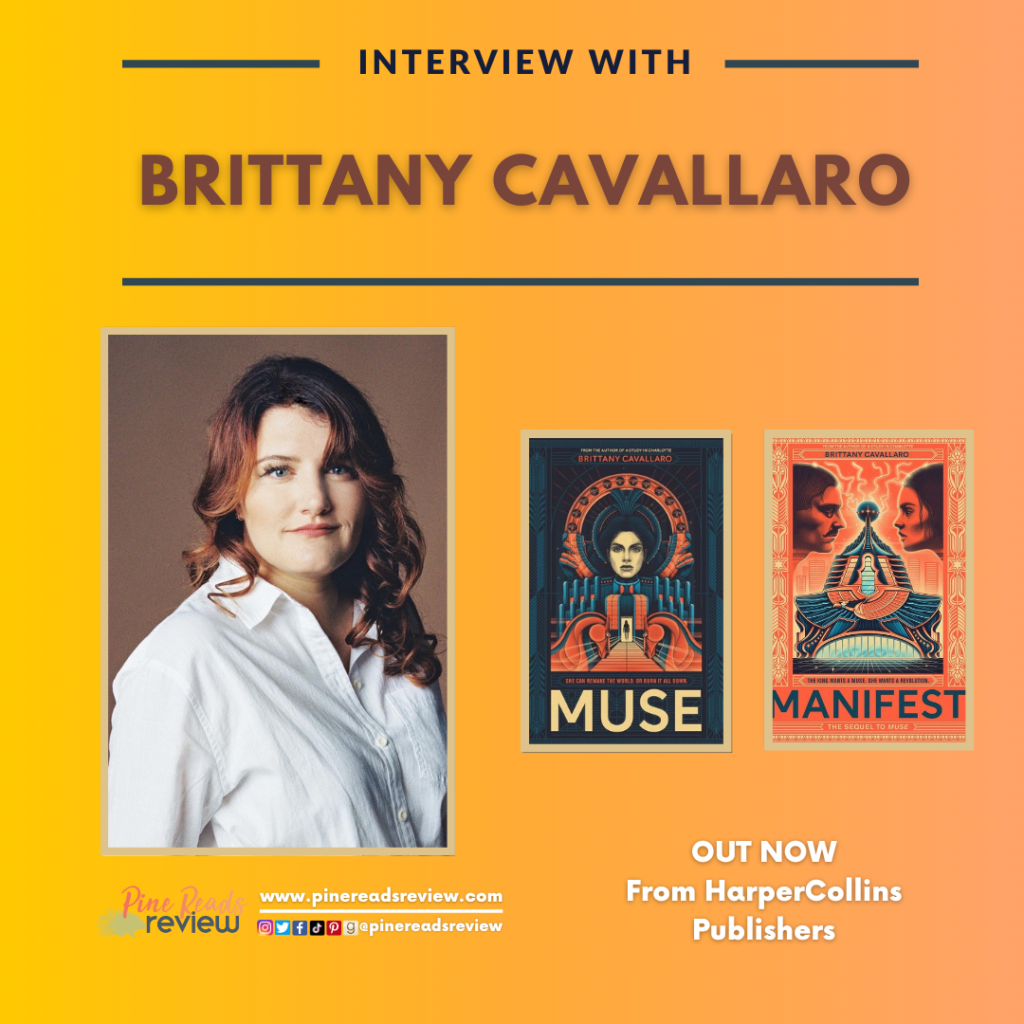
About the Interviewee: “Brittany Cavallaro is the New York Times bestselling author of the Charlotte Holmes novels, including A Study in Charlotte and, most recently, A Question of Holmes (HarperCollins/Katherine Tegen Books). With Emily Henry, she is the author of Hello Girls (HarperCollins/Katherine Tegen Books). Muse, the first novel in a historical fantasy duology, releases in February 2021. Cavallaro is also the author of the poetry collections Girl-King and Unhistorical, both from University of Akron Press. A recipient of a National Endowment in the Arts fellowship, she received her MFA in creative writing from the University of Wisconsin-Madison and her PhD in English literature from the University of Wisconsin-Milwaukee. Currently, she teaches creative writing at the Interlochen Arts Academy in Michigan” (Bio from author’s website).
Find Brittany Cavallaro on the following platforms:
A huge thank you to Brittany Cavallaro for taking the time to do an interview with us at Pine Reads Review! Her newest co-written YA novel, Sunrise Nights, is coming out in June 2024, from HarperCollins Publishers. Also, be sure to check out our review of the Muse duology by Brittany Cavallaro here!
Brittany Cavallaro: Originally, I was drawn to writing for young adults because there was so much more flexibility in terms of the stories you can tell within the young adult category. Mysteries and fantasy novels and contemporary stories are oftentimes all shelved together, unlike in adult fiction, and it felt like there was that same flexibility as an author to jump from genre to genre, which was appealing to me as someone who loves to read and write different kinds of stories.
BC: I think every book helps to prepare the writer for the next one. I’m not sure I would have been brave enough to develop an alternate history setting for Muse had I not learned how to write novels that were set in our own world beforehand. More than anything, it’s helped me clarify what I’m interested in: telling stories about underestimated women trying to take back their power.
BC: I’ve always been fascinated with the Edwardian period in England and America, especially the 1893 Columbian Exposition in Chicago. That’s where I grew up, and I loved how there were still buildings that had been made for this great World’s Fair all these years ago now being used and museums and hotels. Like everyone else, I read and loved Devil in the White City, which helped me to appreciate the scope of the project. I feel like the Columbian Exposition was a testament to human possibility and achievement, and I really wanted to counterbalance it with a feeling of oppression and outmodedness—hence the monarchy.
BC: For me, voice is really the first thing that arrives for a character—I start to understand their psychology and perspective by figuring out what they see when they walk into a room, what they think when they wake up in the morning, how they use language to make a world. Charlotte and Lucille and Claire are all characters that I ‘heard’ before I saw.
BC: The unfortunate reality of women’s places, historically, is that we are in fact disenfranchised and disempowered in so many of our settings, which was of course doubly so if you were a woman of color. I really love a great fantasy story where a female main character begins in a position of power, but I think there’s also a compelling story to be told about a girl who has to find her way to understanding she can claim it. Especially since Claire has been a victim of abuse for so long; she needed a bit of runway before she could take flight.
BC: I was very much writing this against the background of the 2016 election, and like you said, I think there are some parallels between that political situation and the one in Muse. It felt impossible not to write about it in some way.
BC: A book that’s stayed with me for a really long time is Nellie Bly’s journalistic account, called Ten Days in a Madhouse, about the time she spent in an asylum on Blackwell’s Island in New York to report on its conditions. She had (quite easily) convinced the authorities that she was ‘mad,’ and so was able to gain entrance. Sometimes when I dream I find myself on Blackwell’s Island, honestly; the account is searing, emotional, and oftentimes darkly funny. I also very much loved Sarah Waters’s novel Affinity, about a women’s prison, and Margaret Atwood’s Alias Grace, which is also about the carceral system in that time period, and Manifest owes a debt to both of those books.
BC: Aislinn wasn’t a character that I had initially imagined when I came up with the idea for Manifest—without spoiling anything, I hadn’t planned for her to be where we find her—but her backstory was really important for me in understanding the psychology of King Washington. Aislinn is really the first woman that Claire meets where Claire realizes that she can do something to help her—I think it’s where you see Claire finally understand the role that she can play in this damaged world.
BC: I did – the idea was always for a duology! I was lucky to have Harper support that.
BC: I’m so excited to have a novel in verse and conversation out this July called Sunrise Nights, which I co-wrote with Jeff Zentner.
Sam Parker, Pine Reads Review Writer